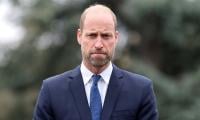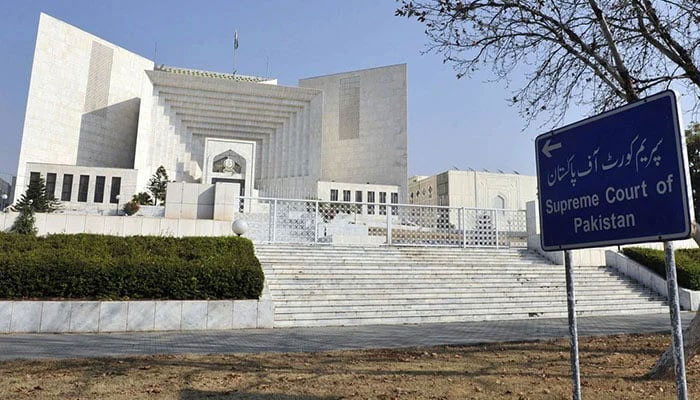Trial of civilians in military courts: SC rejects govt request for full court
Imran Khan, Aitizaz Ahsen, Jawwad S Khwaja and SCBA have challenged the trial of civilians in military courts
ISLAMABAD: The Supreme Court on Tuesday declined the request of the federal government seeking the constitution of a full court for hearing identical petitions challenging the trial of civilians in military courts.
A six-member larger bench of the apex court, headed by Chief Justice Umar Ata Bandial and comprising Justice Ijazul Ahsan, Justice Munib Akhtar, Justice Yahya Afridi, Justice Sayyed Mazahar Ali Akbar Naqvi and Justice Ayesha A. Malik, heard identical petitions, challenging the trial of civilians in the military courts under the Army Act 1952.
Former prime minister and chairman of Pakistan Tehreek-e-Insaf (PTI) Imran Khan, Barrister Aitizaz Ahsen, former Chief Justice of Pakistan Jawwad S Khwaja and Supreme Court Bar Association (SCBA) have challenged the trial of civilians in military courts.
Attorney General Mansoor Usman Awan requested the court to constitute a full court for hearing the instant matter and referred to the note of Justice Yahya Afridi, a member of the bench who had earlier also requested the Chief Justice for constituting a full court. The learned Attorney General submitted that counsels for the petitioners have highlighted the 21st Constitutional Amendment as well as referred to Liaqat Hussain and Brigadier F.B. Ali cases. He recalled that a full court of the apex court had heard the petitions, challenging the 21st Constitutional Amendment, hence he pleaded that a full court should also hear the petitions, challenging the trial of civilians in military courts.
Chief Justice Umer Ata Bandial, however, told the learned Attorney General that two senior judges had already been excused from sitting on the bench while another senior judge recused from the bench after the government raised an objection on him.
Similarly, the Chief Justice government raised objections to him.
Similarly, the Chief Justice said that it is not possible to constitute a full court as most of the judges are not available due to summer vacations adding that the bench has heard the case at length. “Therefore, it will be difficult to constitute a full court at this stage,” the Chief Justice told the AG.
Similarly, Justice Ayesha A Malik asked Attorney General to read out the order passed by the apex court on June 26. The judge pointed out to the AG recusal of one senior judge Justice Mansoor Ali Shah from the present bench.
It is pertinent to mention here that on June 26, Justice Syed Mansoor Ali Shah recused from the bench after the government had raised objections to his presence on the bench for being the relative of former Chief Justice of Pakistan, Jawwad S Khwaja who is a petitioner as well in the matter in hand.
Justice Ayesha A Malik asked the AG whether the government can again request for the formation of a full court. “But I would request that a full court should be constituted on the available judges as well”, the AG replied. Justice Ayesha, however, asked the AG as to who will decide about the availability of judges and further asked as to who has the authority to constitute a full court on the available judges.
The AG replied that the Chief Justice has the authority to constitute a full court comprising the available judges. “When you accept this, then do you think that the Chief Justice has not done so,” Justice Malik asked the AG. Justice Munib Akhtar, another member of the bench, observed that the bench has already extensively heard the instant case and asked the AG to continue his arguments.
Earlier, Abid S Zubairi, President Supreme Court Bar Association (SCBA), who had also challenged the trial of civilians in military courts, commencing his arguments informed the court that he has already submitted that he will concentrate on five points to assist the court. The Chief Justice observed that it will be good to have his viewpoint on the instant case. Zubairi submitted that the apex court in one of its cases in 1999 had held that civilians cannot be tried in the military courts adding that in Liaqat Hussain’s case, this court had held that military courts cannot conduct the trial of civilians.
Similarly, the SCBA president contended that former Chief Justice of Pakistan Justice Ajmal Mian in his judgment had held that only the military personnel could be tried under the military laws adding that according to that judgment, civilians could only be tried in military courts after making amendments in the Constitution.
Abid S Zubairi submitted that the basic point here is as to how the suspects could be linked with the alleged crimes adding that court judgments are in the field in this regard, holding that if the suspects have a direct link with the offences, they could be tried in military courts. “The question now arises as to whether without a constitutional amendment, civilians could be tried under the military laws”, Abid Zubairi submitted. “You mean that a suspect’s link with the offence is the first requirement of the trial and constitutional amendment is also needed”, Chief Justice asked Zubairi.
Abid Zubairi replied in the affirmative. Referring to the F.B. Ali case, Zubairi submitted that the apex court had held that civilians can be tried under the Army Act if they were found to be involved in matters related to defence.
At one point, CJP Bandial said that the ruling in the Liaqat Hussain case stated that military authorities could investigate but not conduct the trial of civilians. Justice Ahsan then asked who would decide when the Army Act was applicable and when it was not. Zuberi replied saying that the police were responsible for investigating and would decide as he wrapped up his arguments.
Justice Yahya Afridi asked whether the SCBA president is of the view that trials of civilians should be done first in civil courts. Zubairi replied in the affirmative. He submitted that without making constitutional amendments, civilians cannot be tried in the military courts.
At this, Chief Justice Umer Ata Bandial asked the SCBA president as to what would happen if civilians were found against the matters relating to national defence. Abid Zubairi, however, contended that even then constitutional amendment was required if civilians were found to be involved against national security.
Elaborating on his point, Abid Zubairi contended that after the May 9 incidents, the Official Secrets Act was applied to some people and not to others, adding that trials in military courts were not conducted before judicial members but those of the executive. To another query, Abid Zubairi submitted that only the civil court can decide whether the military act is applicable or not.
At the outset of the hearing, Irfan Qadir, counsel for the Ministry of Defence, raised objections to the Chief Justice and other two judges of the bench. The Chief Justice, however, asked Irfan Qadir to wait for his turn to argue. Irfan Qadir, however, replied that later the court will say why the objection was not raised earlier.
Earlier, Chief Justice Umer Ata Bandial appreciated that those persons who are in custody are being allowed to meet their families. The Chief Justice further observed that everyone admits that the incidents of May 9 were of a serious nature. However, civilians cannot be subjected to any trial against the Constitution. Meanwhile, the court adjourned the hearing for today (Wednesday).
-
 Jennifer Garner Drops Parenting Truth Bomb On Teens With Kylie Kelce: 'They're Amazing'
Jennifer Garner Drops Parenting Truth Bomb On Teens With Kylie Kelce: 'They're Amazing' -
 AI Is Creating More Security Problems Than It Solves, Report Warns
AI Is Creating More Security Problems Than It Solves, Report Warns -
 'Game Of Thrones' Prequel 'A Knight Of The Seven Kingdoms' New Ratings Mark Huge Milestone
'Game Of Thrones' Prequel 'A Knight Of The Seven Kingdoms' New Ratings Mark Huge Milestone -
 Apple Seeks To Dismiss Fraud Suit Over Siri AI, Epic Injunction
Apple Seeks To Dismiss Fraud Suit Over Siri AI, Epic Injunction -
 Delroy Lindo Explains The Crucial Role Of Musical Arts In Setting Up His Career Trajectory
Delroy Lindo Explains The Crucial Role Of Musical Arts In Setting Up His Career Trajectory -
 Timothée Chalamet Reveals How He Manages To Choose The Best Roles For Himself
Timothée Chalamet Reveals How He Manages To Choose The Best Roles For Himself -
 Princesses Beatrice, Eugenie’s Conflict Gets Exposed As Mom Fergie Takes Over The Media
Princesses Beatrice, Eugenie’s Conflict Gets Exposed As Mom Fergie Takes Over The Media -
 Kate Middleton Plays Rock-paper-scissors In The Rain
Kate Middleton Plays Rock-paper-scissors In The Rain -
 Lindsay Lohan On 'confusing' Teen Fame After 'Mean Girls': 'I Should Have Listened To My Mom And Dad'
Lindsay Lohan On 'confusing' Teen Fame After 'Mean Girls': 'I Should Have Listened To My Mom And Dad' -
 Savannah Guthrie Mom Update: 'Today' Show Sees Huge Ratings Boost Amid Search For Nancy Intensifies
Savannah Guthrie Mom Update: 'Today' Show Sees Huge Ratings Boost Amid Search For Nancy Intensifies -
 Hillary Clinton To Testify In Epstein Probe Alongside Bill Clinton
Hillary Clinton To Testify In Epstein Probe Alongside Bill Clinton -
 Meghan Markle, Prince Harry End Jordan Trip With Meaningful Hospital Visit
Meghan Markle, Prince Harry End Jordan Trip With Meaningful Hospital Visit -
 AI Boyfriends Gain Popularity In China As Young Women Turn To Virtual Romance
AI Boyfriends Gain Popularity In China As Young Women Turn To Virtual Romance -
 Prince William Receives Reality Check As His Media Strategy Fails
Prince William Receives Reality Check As His Media Strategy Fails -
 Zach Braff Reflects On Doing Odd Jobs Ahead Of Major Career Breakthrough In 2001's 'Scrubs'
Zach Braff Reflects On Doing Odd Jobs Ahead Of Major Career Breakthrough In 2001's 'Scrubs' -
 Google Rolls Out Nano Banana 2 With 4K AI Image Generation
Google Rolls Out Nano Banana 2 With 4K AI Image Generation




